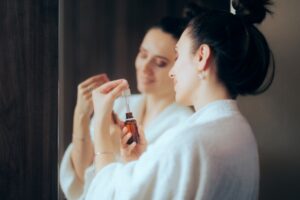Can you use retinol to exfoliate? Bust all the retinol myths and discover how to exfoliate your skin!
Did you know that a single skin care step may help clear your skin? Yes! Exfoliation is a crucial step to achieve that smooth, healthy skin. However, retinol itself is not an exfoliant but is a key ingredient that can be used in conjunction with a healthy exfoliation routine.
Why is Exfoliation Important?
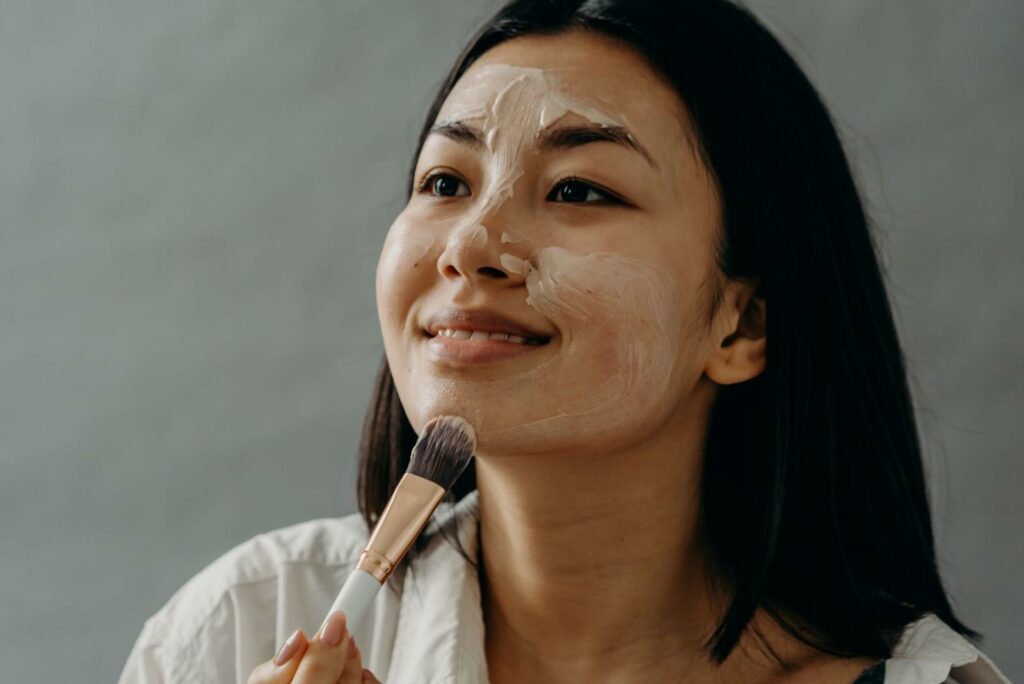
Every two to four weeks, your skin sheds dead cells to create a place for new ones. But, dead cells are not always removed, leading to dry, flaky skin and blocked pores.
This is where exfoliation comes in. It is a necessary step toward healthier, younger-looking skin. When old skin cells accumulate, the skin can appear dull, rough, and uneven.
Exfoliating will get rid of dead skin cells through chemical or physical methods.
- Physical exfoliation uses a textured medium to show the regenerated skin underneath. You can use cleansing scrubs, such as salt and sugar scrubs, dry brushes, pumice stones, loofahs, or mittens. You can also try tools like silicone brushes and pumice stones. If budget is an issue, you can create your DIY scrubs using common home ingredients like coffee grounds and honey.
- Chemical exfoliation, on the other hand, uses different chemicals like hydroxy acids and retinol. If you are not a fan of scrubs, this may work for you. Examples of alpha hydroxy acids include glycolic acid, lactic acid, and citric acid. They will initially loosen up the bonds that hold dead skin cells together. After which, the chemicals will penetrate your skin down to the pores, similar to a deep cleaning.
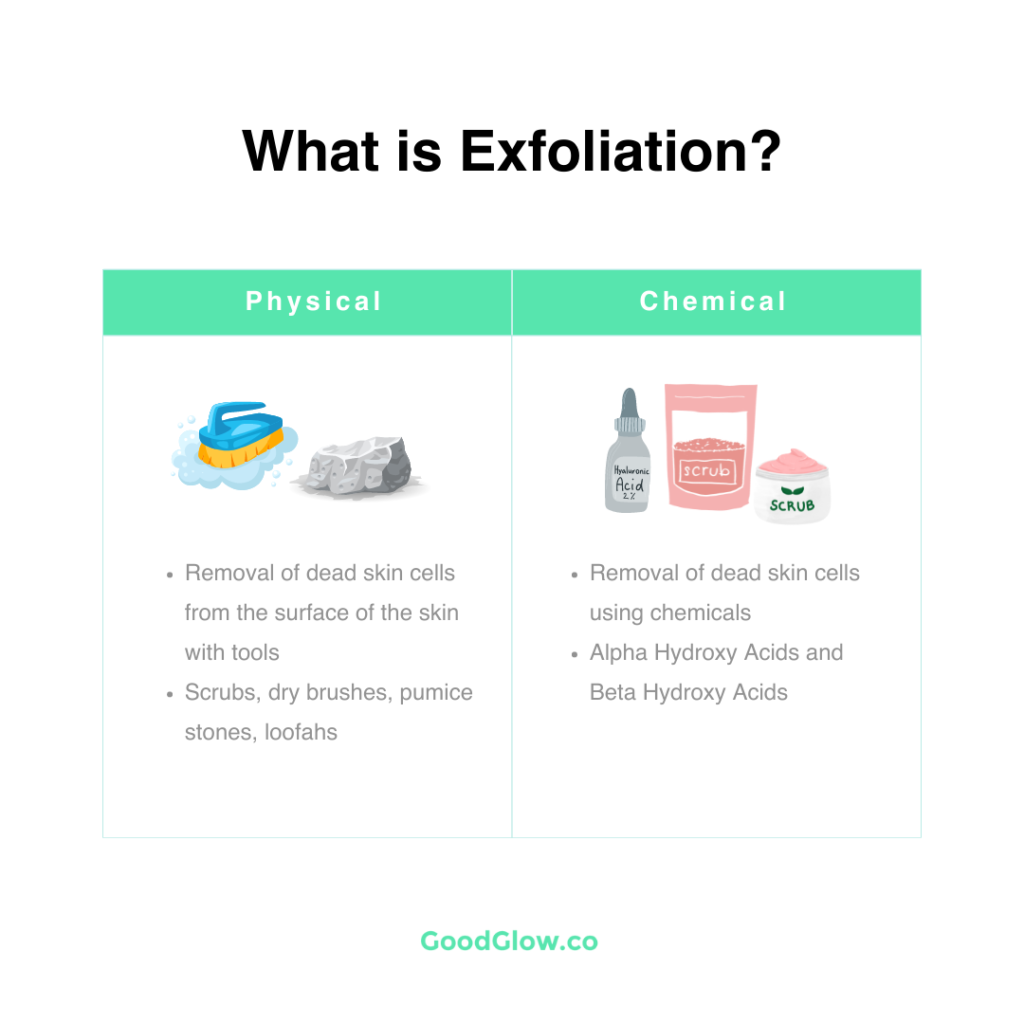
Acne Prevention
Exfoliants unclog pores and help minimize acne outbreaks by clearing the skin of dead skin and other debris and impurities during the exfoliation process.
Enhances Product Absorption
Exfoliants boost the efficiency of skincare products when it removes the additional layer of debris and dead skin cells. This enables your holy grail to penetrate the skin layers further and help you achieve the best your skin can be.
Good for Skin Tone
Exfoliators help with cell turnover, which aids in the smoothing of rough regions and the treatment of acne scars and dark spots.
Promotes the Production of Elastin and Collagen
Exfoliating products increase the suppleness of the skin, making it plumper and tighter. They also help the skin seem younger as they boost the production of elastin and collagen. In effect, the appearance of fine lines and wrinkles are reduced.
Reduces Ingrown Hair
For a healthy skin appearance, ingrown hair must be prevented from going beyond your epidermis. Ingrown hair must also be prevented from reoccurring.
Defy Aging with your Skin Care Routine: Should You Use Retinoids?
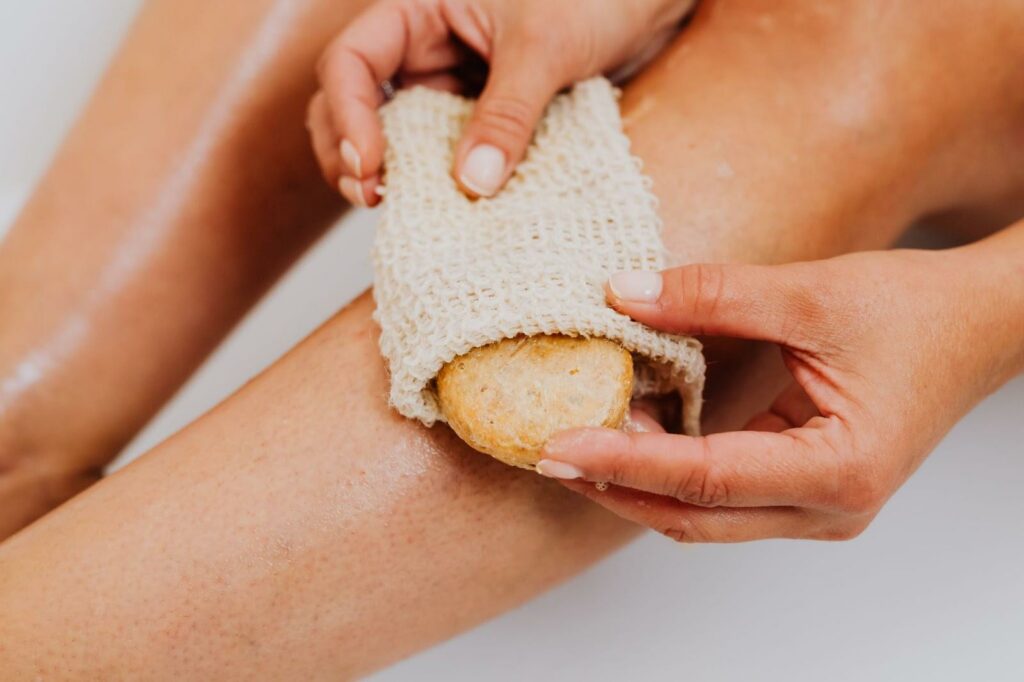
Retinoids are one of the most well-known, well-researched, and dermatologist-recommended skin care compounds – it’s practically an A-lister in beauty and aesthetics!
Despite being misunderstood as an exfoliator, retinol cannot dissolve the glue that keeps dead skin cells on the surface of our skin. Therefore, it is not an exfoliant!
It is an anti-oxidant and an important skin-restoring component that can influence the maturation of skin cells. It can make your skin appear healthier, smoother, and more vibrant.
Why do you Need to Use Retinoids?
Aging is inevitable. With products like retinol, we can magically pause time and enjoy our best years without ever thinking of wrinkles and fine lines!
This has a loyal and enormous audience for a reason, after all. It has been shown to help treat acne, wrinkles, and dark spots, all while improving skin texture and increasing collagen formation.
But that’s not all. Vitamin A derivatives such as retinoids are good for our immunity as well. This is the sign you’re looking for to start using retinol on your face.
Thinking of Starting Retinol? Heed these Precautions!
Despite having many positive effects on the skin, they should be used with caution. While mild irritation is normal as your skin adjusts to the active ingredient, intense flaking, redness, and burning are not—and those with especially sensitive skin, or who suffer from conditions like rosacea or eczema, should be cautious of retinol or avoid it entirely.
What is the Difference between All-Trans Retinoic Acid, Retinol, and Retinal?
Retinoids can confuse regular hoomans like us, especially if Google is your only source!
But don’t worry, here’s a brief breakdown of these vitamin A derivatives for your skincare 101 lessons:
All-Trans Retinoic Acid
Retinoic acid, also known as tretinoin, is your body’s physiologically active version of retinol.
Tretinoin is more potent than over-the-counter medications since it does not need to be converted to be active.
As a result, you may notice an increased flaking reaction for some people, peeling, and irritation as your skin adjusts to such a potent active ingredient. Start with one product, at a low dose, to reduce the risk of irritation.
Retinol
Arguably the most common retinoid on the market, retinol may be the most well-studied topical alternative for skin concerns.
Retinal
This may be one of the most challenging names to distinguish in the skincare industry since it appears to be “retinol” but with a spelling mistake at first glance.
Retinal has been shown in studies to work up to 11 times quicker than retinol. Furthermore, retinal does the job at a far higher rate than retinol, which adds to even-toned, luminous skin.
Exfoliate or Retinol: Which comes first?
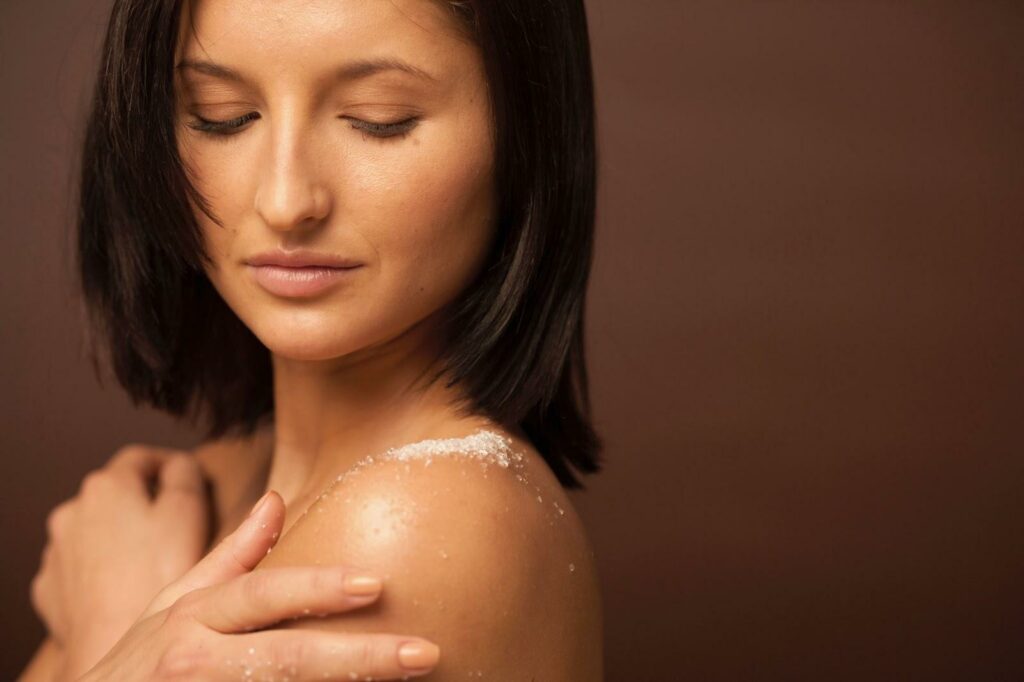
Having the best skin isn’t only a question of genetics. Your everyday activities significantly influence what you see in the mirror.
Creating a skincare routine doesn’t need to involve 21 (or more!) steps. You only need to remember these three essential things:
- Cleanse
- Tone
- Moisturize
Most experts recommend exfoliating twice a week as long as you can tolerate it.
However, you may feel discomfort if you’re using retinol and exfoliating in the same skincare regimen. This is especially so when both are applied on the face immediately after the other.
If you wish to use both, you can use them alternately. For example, use an exfoliating product in the morning and apply retinol products at night.
The purpose of any skincare program is to fine-tune your complexion. It can also target any areas you wish to focus on. During your quest to achieve that glow up, you will discover different products that will help you see results.
Are Retinoids Compatible with Your Skin?

Any skincare product should be taken with great caution and awareness. Since retinoids may cause a flaking reaction and skin irritation, proper usage is highly recommended.
Although you can purchase OTC products with this ingredient, it is better to talk with a dermatologist having retinol work on your face.
Pregnancy and Retinoids
Avoid using this chemical when you have plans to be pregnant, or you are currently pregnant. This may contribute to elevated vitamin A levels in the body. This can be dangerous to a fetus during pregnancy.
Alternatives to Retinol
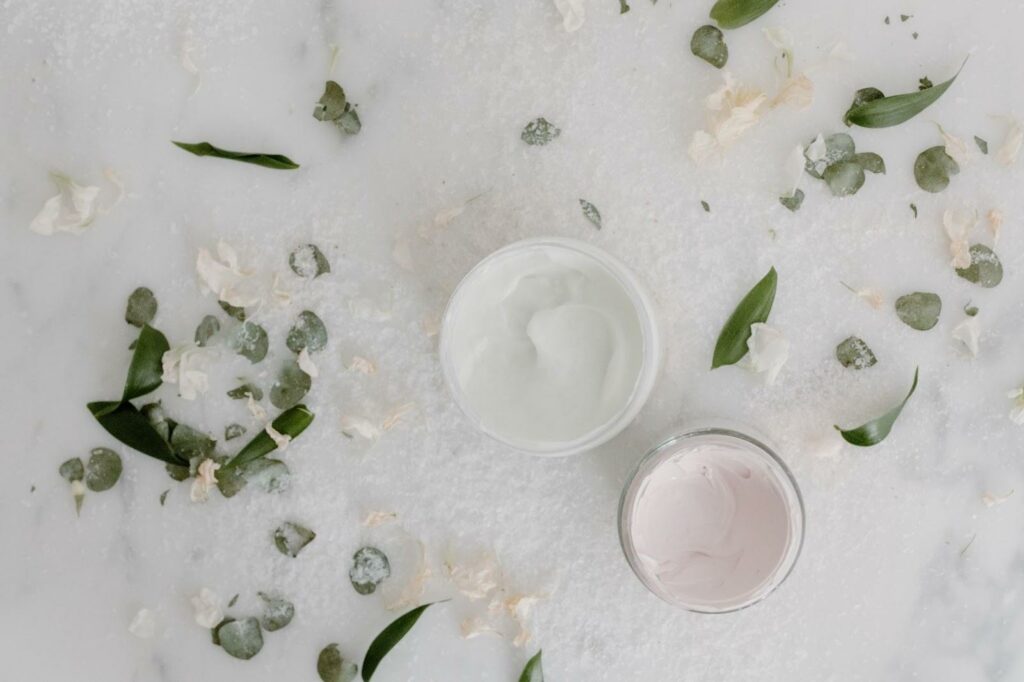
If you have sensitive skin, are pregnant or breastfeeding, here are some alternatives that are safe to use:
Vitamin C + Hyaluronic Acid
One of retinol’s most significant anti-aging effects is its ability to lighten the appearance of dark spots.
In addition, natural elements like Vitamin C products and Hyaluronic Acid demonstrate a plumping effect while protecting your face. They help lighten dark spots as well.
Vitamin B3
Vitamin B3, also known as Niacinamide, is supposed to enhance the look of acne-prone skin types and obvious symptoms of age. To see results though, this vitamin might need to be used for a long time. In order to see quicker results Niacinamide can be used in tandem with retinol. Using Niacinamide can help prevent irritation and dryness sometimes associated with retinol use for those with sensitive skin.
Alpha Hydroxy Acids & Beta Hydroxy Acids
AHAs and BHAs, such as lactic acid and glycolic acid, work together to offer the skin a double dose of acne-clearing and texture-refining power.
By eliminating dead cells and pollution collected on the skin’s surface as grime, the skin transforms and appears cleaner, softer, and more radiant.
However, sometimes, AHA or BHA products may not be that life-changing. What works for someone else may not work for you, and that’s life!
If your condition remains the same or worsens, consult your doctor immediately.
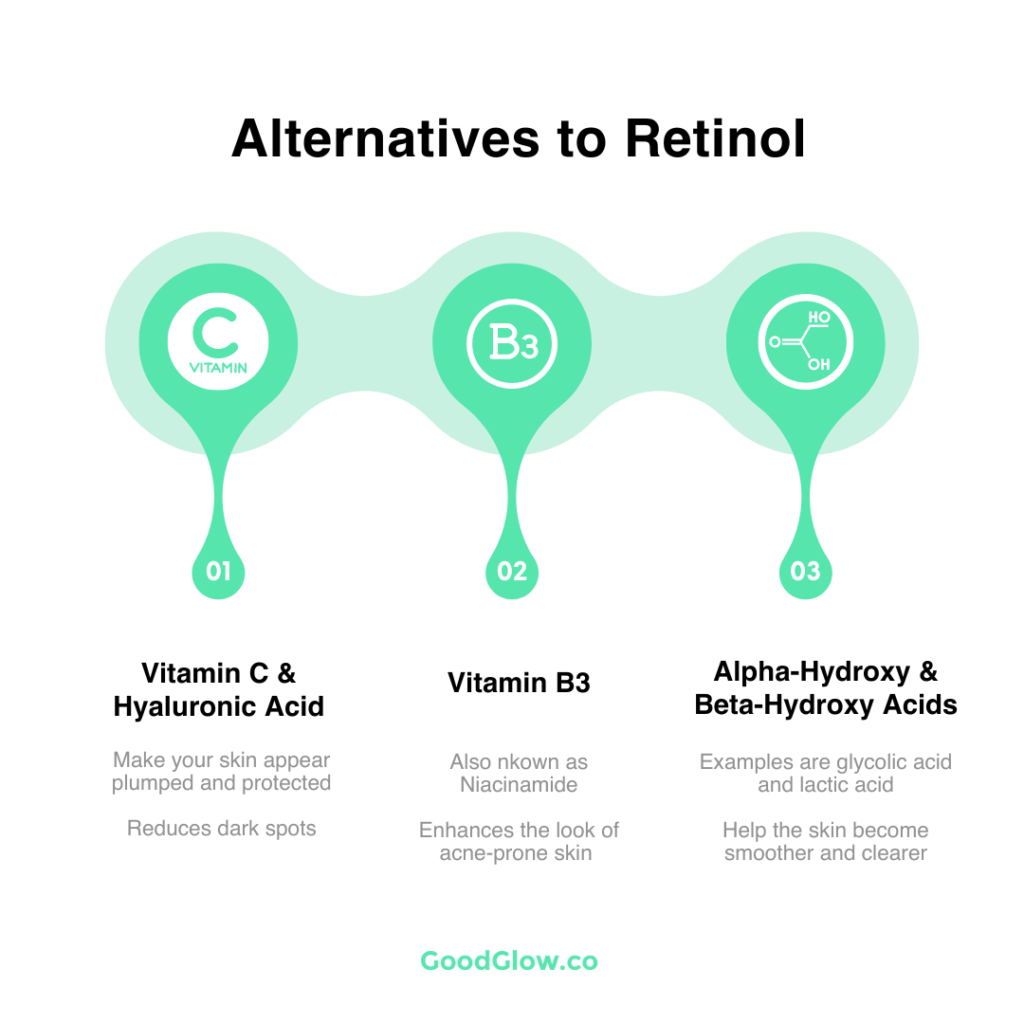
Conclusion
Retinol is not an exfoliant. Instead, it is an anti-oxidant that helps the skin in many ways. Exfoliants and retinol can help fade dark spots, unclog pores, and soften the skin for a more youthful glow.
You can exfoliate the skin and use products with retinol so long as you can tolerate its side effects. However, a healthy diet and avoiding being under the sun for too long are still the key to a bright complexion.
If you suffer from acne, wrinkles, and hyperpigmentation, this highly informative eBook can help address your skin needs!
FAQs
A: Exfoliants help remove dead skin cells, while retinol helps restore the skin’s renewal as an antioxidant.
A: Doing both simultaneously might cause dry and irritated skin, especially if done simultaneously. Use an exfoliating product in the morning and apply retinol at night. Start with a low dose to avoid adverse reaction
A: Yes. Watch out for unwanted side effects such as peeling, irritation, or itchiness. Wear sunscreen in the morning since retinol can make your skin more sensitive to the sun.
A: Introduce one product at a time. Use an exfoliant in the morning and use a retinol product at night.
A: It depends on what your skin can tolerate. Physical and chemical exfoliation have varying effects on different people.
Sources:
“5 Ways to Exfoliate Your Skin Without Irritation.” Cleveland Clinic, 12 Feb. 2020, health.clevelandclinic.org/5-ways-to-exfoliate-your-skin-without-irritation.
“Epidermal Effects of Retinoids: In Vitro Studies.” Epidermal Effects of Retinoids: In Vitro Studies – ScienceDirect, 6 Aug. 2008, www.sciencedirect.com/science/article/abs/pii/S0190962286702351.
“Ingrown Hairs.” Ingrown Hairs | Johns Hopkins Medicine, 19 Nov. 2019, www.hopkinsmedicine.org/health/conditions-and-diseases/ingrown-hairs.
“Is Vitamin A an Antioxidant or a Pro-oxidant? – PubMed.” PubMed, 12 Oct. 2017, pubmed.ncbi.nlm.nih.gov/28937764.
“Pregnancy Outcome Following Exposure to Topical Retinoids: A Multicenter Prospective Study – PubMed.” PubMed, 1 Dec. 2012, pubmed.ncbi.nlm.nih.gov/22174426.
Alberts, Bruce, et al. “Epidermis and Its Renewal by Stem Cells – Molecular Biology of the Cell – NCBI Bookshelf.” Epidermis and Its Renewal by Stem Cells – Molecular Biology of the Cell – NCBI Bookshelf, 1 Jan. 2002, www.ncbi.nlm.nih.gov/books/NBK26865.
Cooper, Beth. “AHA Vs. BHA Exfoliating Acid: Which Is Better for You?” GoodGlow, 16 Nov. 2022, goodglow.co/aha-vs-bha.
Kraft, John, and Anatoli Freiman. “Management of Acne.” PubMed Central (PMC), www.ncbi.nlm.nih.gov/pmc/articles/PMC3080563. Accessed 25 Nov.
2022.
Leyden, James, et al. “Why Topical Retinoids Are Mainstay of Therapy for Acne.” PubMed Central (PMC), 5 June 2017, www.ncbi.nlm.nih.gov/pmc/articles/PMC5574737.
Makrantonaki, Evgenia, et al. “Genetics and Skin Aging.” PubMed Central (PMC), www.ncbi.nlm.nih.gov/pmc/articles/PMC3583889. Accessed 25 Nov. 2022.
Mukherjee, Siddharth, et al. “Retinoids in the Treatment of Skin Aging: An Overview of Clinical Efficacy and Safety.” PubMed Central (PMC), 1 Dec. 2006, www.ncbi.nlm.nih.gov/pmc/articles/PMC2699641.
Mukherjee, Siddharth, et al. “Retinoids in the Treatment of Skin Aging: An Overview of Clinical Efficacy and Safety.” PubMed Central (PMC), 1 Dec. 2006, www.ncbi.nlm.nih.gov/pmc/articles/PMC2699641.
Nera, Stephanie. “Collagen Serum Vs Hyaluronic Acid: What’s Best for Your Skin?- GoodGlow.” GoodGlow, 7 Feb. 2022, goodglow.co/collagen-serum-vs-hyaluronic-acid.
Nera, Stephanie. “Does Collagen Help Acne? – GoodGlow.” GoodGlow, 21 Feb. 2022, goodglow.co/does-collagen-help-acne.
Nera, Stephanie. “Top 3 Side Effects of Collagen Supplementation.” GoodGlow, 7 Feb. 2022, goodglow.co/collagen-allergy-symptoms.
Pullar, Juliet M., et al. “The Roles of Vitamin C in Skin Health.” PubMed Central (PMC), 12 Aug. 2017, www.ncbi.nlm.nih.gov/pmc/articles/PMC5579659.
Rodan, Katie, et al. “Skincare Bootcamp: The Evolving Role of Skincare.” PubMed Central (PMC), 14 Dec. 2016, www.ncbi.nlm.nih.gov/pmc/articles/PMC5172479.
Rodan, Katie, et al. “Skincare Bootcamp: The Evolving Role of Skincare.” PubMed Central (PMC), 14 Dec. 2016, www.ncbi.nlm.nih.gov/pmc/articles/PMC5172479.
Soleymani, Teo, et al. “A Practical Approach to Chemical Peels: A Review of Fundamentals and Step-by-step Algorithmic Protocol for Treatment.” PubMed Central (PMC), 1 Aug. 2018, www.ncbi.nlm.nih.gov/pmc/articles/PMC6122508.
Sydel, Simone. “The 7 Best Face Washes for Hyperpigmentation in 2022.” GoodGlow, 7 June 2022, goodglow.co/best-face-washes-for-hyperpigmentation.
Sydel, Simone. “The Key Differences: Acne Marks Vs. Acne Scars.” GoodGlow, 19 Nov. 2022, goodglow.co/acne-marks-vs-acne-scars.
Tang, Sheau-Chung, and Jen-Hung Yang. “Dual Effects of Alpha-Hydroxy Acids on the Skin.” PubMed Central (PMC), 10 Apr. 2018, www.ncbi.nlm.nih.gov/pmc/articles/PMC6017965.
Wood, Sam. “7 Best Chemical Peels for Acne Scars.” GoodGlow, 20 Oct. 2022, goodglow.co/best-chemical-peels-acne-scars.
Wood, Sam. “Bakuchiol Vs Retinol: What’s Better for Acne?” GoodGlow,
13 Oct. 2022, goodglow.co/bakuchiol-vs-retinol-whats-better-acne.
Wood, Sam. “Does Retinol Help Acne? (It Depends)” GoodGlow, 24 Jan. 2022, goodglow.co/does-retinol-help-acne.
